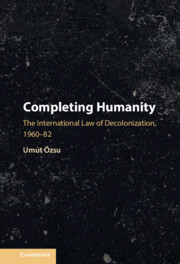Book contents
- Completing Humanity
- Completing Humanity
- Copyright page
- Dedication
- Epigraph
- Contents
- Acknowledgements
- Note on Terminology and Translations
- Table of Cases
- Table of Treaties and Other Instruments
- Table of Resolutions
- Table of Domestic Statutes
- Abbreviations
- Introduction
- 1 Fixing Selves
- 2 Forging Universals
- 3 Redistributing Resources
- 4 Pooling Rights
- 5 Righting Markets
- Conclusion
- Bibliography
- Index
1 - Fixing Selves
Published online by Cambridge University Press: 16 January 2024
- Completing Humanity
- Completing Humanity
- Copyright page
- Dedication
- Epigraph
- Contents
- Acknowledgements
- Note on Terminology and Translations
- Table of Cases
- Table of Treaties and Other Instruments
- Table of Resolutions
- Table of Domestic Statutes
- Abbreviations
- Introduction
- 1 Fixing Selves
- 2 Forging Universals
- 3 Redistributing Resources
- 4 Pooling Rights
- 5 Righting Markets
- Conclusion
- Bibliography
- Index
Summary
This chapter analyzes the negotiations for the 1970 Friendly Relations Declaration, the high-water mark of efforts by socialist and non-aligned states to win support for an expansive interpretation of national self-determination. Lawyers and diplomats from industrialized states typically argued that the right to self-determination could be exercised in a number of different ways, including loose association or confederation. They also maintained that self-determination, understood as a human right, could be secured through adequate recognition within states and did not necessarily require secession. By contrast, those speaking on behalf of the states and peoples of Asia, Africa, and other zones of decolonization framed self-determination in more capacious terms, as a right to ‘economic’ no less than ‘political’ sovereignty. Arguing that formal independence meant little if decolonized states remained hampered by earlier arrangements, they called for an international redistribution of rights and resources. They also stressed that the right to self-determination permitted armed struggle against colonial and occupying powers. Crafted through close engagement with such arguments, the 1970 resolution formalized an unsteady compromise between these two approaches, encouraging self-determination but never so far as to destabilize a fragile interstate system undergoing extensive reconfiguration.
Keywords
- Type
- Chapter
- Information
- Completing HumanityThe International Law of Decolonization, 1960–82, pp. 36 - 71Publisher: Cambridge University PressPrint publication year: 2023

